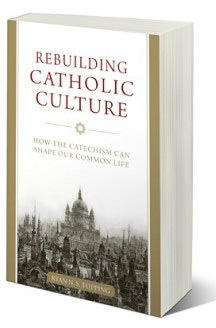Reading the Catechism, Rebuilding Catholic Culture

Reading the Catechism
, Rebuilding Catholic Culture | Carl E. Olson | Catholic World Report
An Interview with the author of Rebuilding Catholic
Culture: How The Catechism Can Shape Our Common Life
Dr. Ryan N. S. Topping earned a doctorate in theology at
Oxford, is a Fellow at Thomas More College in New Hampshire, and has written
two books about St. Augustine. His recently published book, Rebuilding
Catholic Culture: How The Catechism Can Shape Our Common Life (Sophia Institute Press, 2012), has been praised by
Fr. Aidan Nichols, OP (“This book deserves to  take its place among the Catholic
take its place among the Catholic
classics.”), Joseph Pearce (“Ryan Topping wields the Catechism as a weapon of wisdom…”), and Fr. John Saward (“This
profound work of scholarship is a delight to read.”), among others.
Dr. Topping corresponded recently with Catholic World
Report about his book, and discussed the Catechism
of the Catholic Church, resisting the
modern and secular “masters”, the challenges posed by modernity, the various
assaults on Catholicism and the family, and why Kant rules our days and
Nietzsche our night life.
Catholic World Report: It has now been nearly twenty years since the Catechism
of the Catholic Church was published
in English. How well or how poorly do you think it has been received and used
in that time? How do you hope Rebuilding Catholic Culture will inspire a deeper reading and appreciation of
the Catechism?
Dr. Topping: The work of the restoration of culture is the work
of saints. How are saints born? They are born through grace, to be sure. But
grace is aided by precept and example. The task of reclaiming our culture
for the Church is a battle with many fronts. Far more important than good books
is the renewal of liturgy within our churches and the restoration of order
within our families and schools. Books rarely excite without lively teachers to
place them in our hands.
To explain a doctrine is to teach, but to illustrate how its
meaning can transform action is to excite. I tried to keep both of these aims
in view while writing. My hope is that Rebuilding Catholic Culture will in some small way strengthen the nerve and
excite the imagination of its readers.
CWR:
You write, in the Introduction, that, “Intellectual humility is a great good,
but self-imposed humiliation before our medical, moral, and political masters
is unbecoming.” What are some examples of that “self-imposed humiliation” and
why do so many Catholics embrace it? What are some examples of these modern masters?
Dr. Topping: We improperly
censure ourselves each time we talk about “faith communities” or “Christian
values” or “gender”. None of these things exist in the Catholic lexicon. We
belong to the Church, believe in good and evil, and are created male and
female. Language shapes our perceptions. We need to recapture once more,
through catechesis and in our schools and colleges, a grounding in the basics
of Catholic philosophy. Not that everyone needs to become a scholar. But good
philosophy is needed if only to counter bad philosophy. And our public
discourse has been dominated for a very long time by those versed in sub-human
philosophy.
How to reverse this trend? Every profession and trade affords its own
opportunities for heroism. If you are a college president, refuse to remove
crucifixes from your classrooms. If you are a principal of a Catholic high
school, hire Catholic teachers. If you are a Catholic doctor, stick your neck
out and refuse to prescribe contraception. If you are a mother, know what your
children are being taught at school, and assert your role as the primary
educator.
CWR: A
central theme of your book is the uneasy and often contentious relationship
between modernity and Catholicism. Why are you so hard on modernity? Hasn't it
produced all sorts of wonderful technological, medical, and cultural advances
and accomplishments? Are you simply pining for a golden age of Catholicism when
the Church dominated culture and every other aspect of life? Aren’t you a bit
young to be nostalgic for the Middle Ages?
Carl E. Olson's Blog
- Carl E. Olson's profile
- 20 followers



